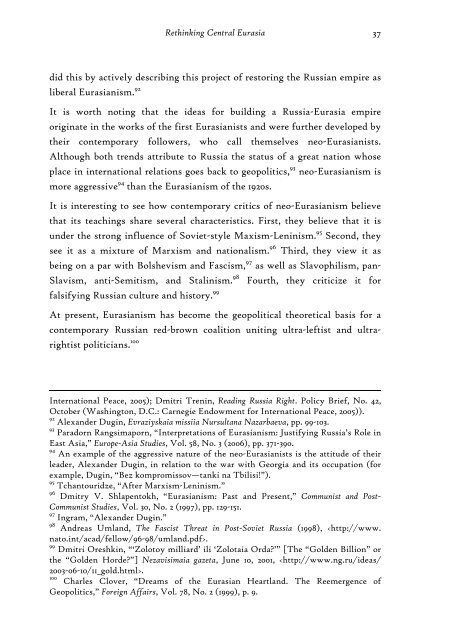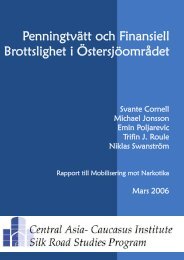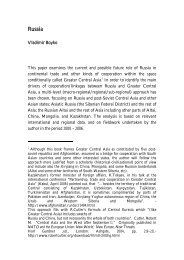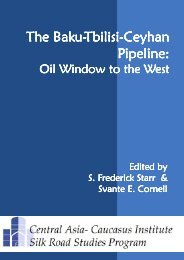Eurasianism and the Concept of Central Caucaso-Asia
Eurasianism and the Concept of Central Caucaso-Asia
Eurasianism and the Concept of Central Caucaso-Asia
Create successful ePaper yourself
Turn your PDF publications into a flip-book with our unique Google optimized e-Paper software.
Rethinking <strong>Central</strong> Eurasia 37<br />
did this by actively describing this project <strong>of</strong> restoring <strong>the</strong> Russian empire as<br />
liberal <strong>Eurasianism</strong>. 92<br />
It is worth noting that <strong>the</strong> ideas for building a Russia-Eurasia empire<br />
originate in <strong>the</strong> works <strong>of</strong> <strong>the</strong> first Eurasianists <strong>and</strong> were fur<strong>the</strong>r developed by<br />
<strong>the</strong>ir contemporary followers, who call <strong>the</strong>mselves neo-Eurasianists.<br />
Although both trends attribute to Russia <strong>the</strong> status <strong>of</strong> a great nation whose<br />
place in international relations goes back to geopolitics, 93 neo-<strong>Eurasianism</strong> is<br />
more aggressive 94 than <strong>the</strong> <strong>Eurasianism</strong> <strong>of</strong> <strong>the</strong> 1920s.<br />
It is interesting to see how contemporary critics <strong>of</strong> neo-<strong>Eurasianism</strong> believe<br />
that its teachings share several characteristics. First, <strong>the</strong>y believe that it is<br />
under <strong>the</strong> strong influence <strong>of</strong> Soviet-style Maxism-Leninism. 95 Second, <strong>the</strong>y<br />
see it as a mixture <strong>of</strong> Marxism <strong>and</strong> nationalism. 96 Third, <strong>the</strong>y view it as<br />
being on a par with Bolshevism <strong>and</strong> Fascism, 97 as well as Slavophilism, pan-<br />
Slavism, anti-Semitism, <strong>and</strong> Stalinism. 98 Fourth, <strong>the</strong>y criticize it for<br />
falsifying Russian culture <strong>and</strong> history. 99<br />
At present, <strong>Eurasianism</strong> has become <strong>the</strong> geopolitical <strong>the</strong>oretical basis for a<br />
contemporary Russian red-brown coalition uniting ultra-leftist <strong>and</strong> ultrarightist<br />
politicians. 100<br />
International Peace, 2005); Dmitri Trenin, Reading Russia Right. Policy Brief, No. 42,<br />
October (Washington, D.C.: Carnegie Endowment for International Peace, 2005)).<br />
92 Alex<strong>and</strong>er Dugin, Evraziyskaia missiia Nursultana Nazarbaeva, pp. 99-103.<br />
93 Paradorn Rangsimaporn, “Interpretations <strong>of</strong> <strong>Eurasianism</strong>: Justifying Russia’s Role in<br />
East <strong>Asia</strong>,” Europe-<strong>Asia</strong> Studies, Vol. 58, No. 3 (2006), pp. 371-390.<br />
94 An example <strong>of</strong> <strong>the</strong> aggressive nature <strong>of</strong> <strong>the</strong> neo-Eurasianists is <strong>the</strong> attitude <strong>of</strong> <strong>the</strong>ir<br />
leader, Alex<strong>and</strong>er Dugin, in relation to <strong>the</strong> war with Georgia <strong>and</strong> its occupation (for<br />
example, Dugin, “Bez kompromissov—tanki na Tbilisi!”).<br />
95 Tchantouridze, “After Marxism-Leninism.”<br />
96 Dmitry V. Shlapentokh, “<strong>Eurasianism</strong>: Past <strong>and</strong> Present,” Communist <strong>and</strong> Post-<br />
Communist Studies, Vol. 30, No. 2 (1997), pp. 129-151.<br />
97 Ingram, “Alex<strong>and</strong>er Dugin.”<br />
98 Andreas Uml<strong>and</strong>, The Fascist Threat in Post-Soviet Russia (1998), .<br />
99 Dmitri Oreshkin, “‘Zolotoy milliard’ ili ‘Zolotaia Orda?’” [The “Golden Billion” or<br />
<strong>the</strong> “Golden Horde?”] Nezavisimaia gazeta, June 10, 2001, .<br />
100 Charles Clover, “Dreams <strong>of</strong> <strong>the</strong> Eurasian Heartl<strong>and</strong>. The Reemergence <strong>of</strong><br />
Geopolitics,” Foreign Affairs, Vol. 78, No. 2 (1999), p. 9.






